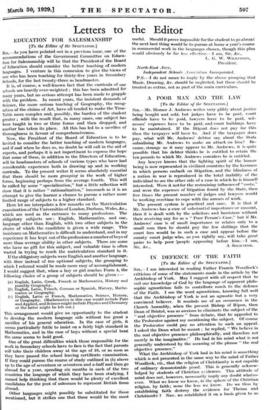A POOR MAN AND THE LAW
[To the Editor of the SPECTATOR.] SIR,—Mr. Horace J. Andrews writes very glibly about justice being bought and sold, but judges have to be paid, court officials have to be paid, lawyers have to be paid, wit- nesses' expenses have to be paid, and court buildings have to be maintained. If the litigant does not pay for this then the taxpayer will have to. And if the taxpayer does pay, what will Mr. Andrews' debtor say about the State subsidising Mr. Andrews to make an attack on him? Be- cause, strange as it may appear to Mr. Andrews, it is quite possible that his debtor thinks he is entitled to retain the ten pounds to which Mr. Andrews considers he is entitled.
Any lawyer knows that the fighting spirit of the htunae being is now represented in civilized countries by the keenness in which persons embark on litigation, and the blindness of a nation in war is reproduced in the total inability of the individual to see the other side of a ease in which he is himself interested. Were it not for the restraining influenceof "costs," and were the expenses of litigation found by the State, then five times the present number of judges and lawyers would be working overtime to cope with the arrears of work.
The present system is practical and sane. It is that if Mr. Andrews has a case of substantial importance or amount, then it is dealt with by the solicitors and barristers without their receiving any fee as a " Poor Person's Case," but if Mr. Andrews' case is of small importance or relates only to a small sum then he should pay the few shillings that the court fees would be in such a case and appear before the county court judge who, as you rightly say, will take great pains to help poor [people appearing before him.—I am,


















































 Previous page
Previous page